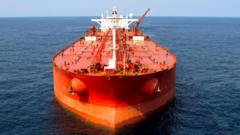Global oil prices surged dramatically after Israel confirmed it had launched strikes against Iran, marking a major escalation in Middle Eastern tensions. The benchmark Brent crude oil price soared more than 10% shortly after the announcement, hitting its highest mark since January. Market analysts are apprehensive that military conflict between the two nations could jeopardize oil supplies from this energy-rich region.
While oil prices retreated slightly after their initial spike, Brent crude remained over 5% higher than its closing price on Thursday, trading around $74.47 a barrel. Although prices have surged recently, they are still down more than 10% from last year's levels, and notably lower than the highs reached in early 2022 during the crisis following Russia's invasion of Ukraine, which saw prices exceed $100 a barrel.
In the wake of these events, stock markets across Asia and Europe experienced declines. Japan's Nikkei index fell by 0.9%, and the UK's FTSE 100 index was down 0.3% by midday. The US stock market also opened lower, with the Dow Jones dropping 1.5% and the S&P 500 falling 0.8%. Conversely, traditional "safe haven" assets such as gold and the Swiss franc gained in value as investors sought stability amid the growing uncertainty. Gold reached its highest price in nearly two months, climbing 1.2% to $3,423.30 an ounce.
As tensions escalated, the Israeli Defence Forces reported that Iran had launched around 100 drones towards Israel. Analysts caution that the situation could either de-escalate quickly, as seen in similar past encounters, or spiral into a broader conflict that would severely disrupt oil supplies in the Middle East. According to Capital Economics, if conflict were to target Iran's oil production capabilities, prices might surge to between $80 and $100 a barrel, although such increases could prompt other oil producers to boost output, ultimately moderating price impacts.
As fuel prices rise and impact consumer costs, Rod Dennis from the UK motoring group RAC noted it was premature to assess the impact of increasing oil prices on petrol costs, emphasizing the need to monitor wholesale prices and retailer margins moving forward.
If Iran were to target vital shipping infrastructure in the Strait of Hormuz, global oil supply could be impacted drastically, given that around a fifth of the world's oil passes through this crucial maritime route. The Strait of Hormuz, bounded by Iran and Oman, serves as a critical passage for oil and gas shipments from major producers in the Middle East.
Market responses to these geopolitical tensions are still evolving, and experts predict that how events develop in the coming days will be crucial to determining the longer-term implications for energy prices.






















